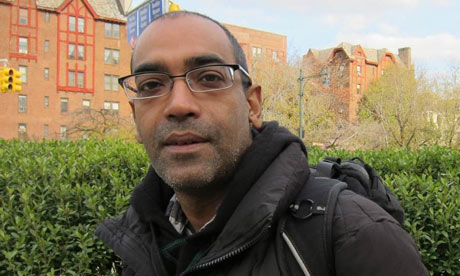'There is a sad irony to the fact that a book about contemporary India appears only in partial form for Indian readers

Siddhartha Deb. Photograph: Ranen Lal Deb
Last month my book, The Beautiful and the Damned, a narrative non-fiction account of contemporary India, appeared in the UK. The same book will now come out in India, but without its first chapter. Instead, there will be a note explaining that an injunction was issued against the chapter by a small provincial court in India, making it legally impossible to publish it until the matter had been resolved in the courts.
In a sequence of five narratives that looks at the lives of Indians from the very rich to the very poor, the first chapter focused on Arindam Chaudhuri, a tremendously successful management guru who runs a group of companies that includes a cluster of business education schools known as the Indian Institute of Planning and Management (IIPM). Built upon a series of interviews with Chaudhuri, a flamboyant, pony-tailed figure who is chauffeured around Delhi in a Bentley, the chapter was, to my mind, a nuanced portrait of the man and his business. It looked at the aspirations unleashed in the new India, both in figures such as Chaudhuri, whose face stares out at one from advertisements in virtually every newspaper and magazine of note, to the largely provincial middle-class students who flock to his schools in their desire to make it into the world of business management.
It's an aspiration I partly understand, having come from a not particularly privileged background myself. People had the chance to read an excerpt from the chapter in the February issue of Caravan, a magazine published from Delhi. I feel that the portrait was a fair one. Nevertheless, on 30 April, a court in Silchar, a small town in the north-eastern state of Assam that is more than 2,000km from Delhi, issued an injunction against the Caravan article and the chapter. No notice was received by any of the defendants before the injunction was issued. The suit, for which court fees of Rs11,000 (£150) were paid, claims damages of 50 crore rupees (£7m) for defamation from the publisher and editor of Caravan Magazine, me, Penguin and Google India.
Full story at The Guardian
In a sequence of five narratives that looks at the lives of Indians from the very rich to the very poor, the first chapter focused on Arindam Chaudhuri, a tremendously successful management guru who runs a group of companies that includes a cluster of business education schools known as the Indian Institute of Planning and Management (IIPM). Built upon a series of interviews with Chaudhuri, a flamboyant, pony-tailed figure who is chauffeured around Delhi in a Bentley, the chapter was, to my mind, a nuanced portrait of the man and his business. It looked at the aspirations unleashed in the new India, both in figures such as Chaudhuri, whose face stares out at one from advertisements in virtually every newspaper and magazine of note, to the largely provincial middle-class students who flock to his schools in their desire to make it into the world of business management.
It's an aspiration I partly understand, having come from a not particularly privileged background myself. People had the chance to read an excerpt from the chapter in the February issue of Caravan, a magazine published from Delhi. I feel that the portrait was a fair one. Nevertheless, on 30 April, a court in Silchar, a small town in the north-eastern state of Assam that is more than 2,000km from Delhi, issued an injunction against the Caravan article and the chapter. No notice was received by any of the defendants before the injunction was issued. The suit, for which court fees of Rs11,000 (£150) were paid, claims damages of 50 crore rupees (£7m) for defamation from the publisher and editor of Caravan Magazine, me, Penguin and Google India.
Full story at The Guardian
No comments:
Post a Comment